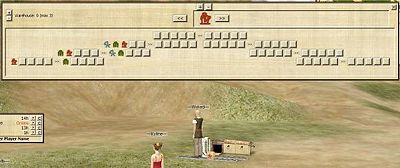The Wiki for Tale 4 is in read-only mode and is available for archival and reference purposes only. Please visit the current Tale 11 Wiki in the meantime.
If you have any issues with this Wiki, please post in #wiki-editing on Discord or contact Brad in-game.
Difference between revisions of "Principles of Thought"
| Line 57: | Line 57: | ||
== Designing == | == Designing == | ||
[[Image:Empty_Hand_Set_Up.JPG|400px|thumb|left|Empty Hand set up dialogue]] | [[Image:Empty_Hand_Set_Up.JPG|400px|thumb|left|Empty Hand set up dialogue]] | ||
| + | |||
| + | You have severl areas to map. at the top left is your warehouse. this will hold extra blocks that could be used later in play. The top middle is your starting block(s). The open middle playfield is what transitions are allowed. Each section (boxes)>>(boxes) is a seperate transition. The block color coding on the left can be turned into the color coding on the right. | ||
== Playing == | == Playing == | ||
Revision as of 00:00, 18 December 2008
Principles of Thought
Build an Empty Hand Puzzle and have 7 people solve and rate it.
- Dry Flax
- Gather Clay
- Make Rope
- Dig Limestone
- Crush Cabbage for Juice
- Gather Red Sand
- Grate Carrots for Juice
- Build an Empty Hand Puzzle
- Design an Empty Hand Puzzle and Solve it
- Have 7 Judges solve and rate your Empty Hand Puzzle
- All of the above, OR solve three recently recognized Empty Hand
- NOTE: You must "claim your rights" on the puzzle before closing the tab to get the zap.
Once you pass the principle, you will gain a level and will also be able to sign up for the seven Tests of the Thought discipline (provided that you meet the level requirements).
Level Required: 3
Demonstrate the Principle
What it will take to unlock the test for Egypt.
- 1000 Dried Flax
- 1200 Thorns
- 500 Boards
- 300 Rope
- 900 Cabbage Juice
- 900 Red Sand
- 900 Carrot Juice
- 900 Clay
- 900 Limestone
- 900 Grass
Demonstrated by NatuBo in Shabbat Ab on 2008-12-17.
Building
Empty Hand Puzzle
- 20 Dried Flax for stuffing Blocks
- 25 Thorns for Block Separators
- 80 Clay for Base
- 50 Boards for Holding Area
- 60 Limestone for extra Block weight
- 30 Rope for Mechanism
Built in a Small Construction Site (4 Rope, 1 Canvas).
Each Block Added
- 7 Cabbage Juice (for Coloring Purple Face)
- 7 Red Sand (for Coloring Red Face)
- 7 Limestone (for Coloring Light Face)
- 7 Clay (for Coloring Brown Face)
- 7 Carrot Juice (for Coloring Orange Face)
- 7 Grass (for Coloring Green Face)
- 1 Canvas (for Cushioning)
Designing
You have severl areas to map. at the top left is your warehouse. this will hold extra blocks that could be used later in play. The top middle is your starting block(s). The open middle playfield is what transitions are allowed. Each section (boxes)>>(boxes) is a seperate transition. The block color coding on the left can be turned into the color coding on the right.
